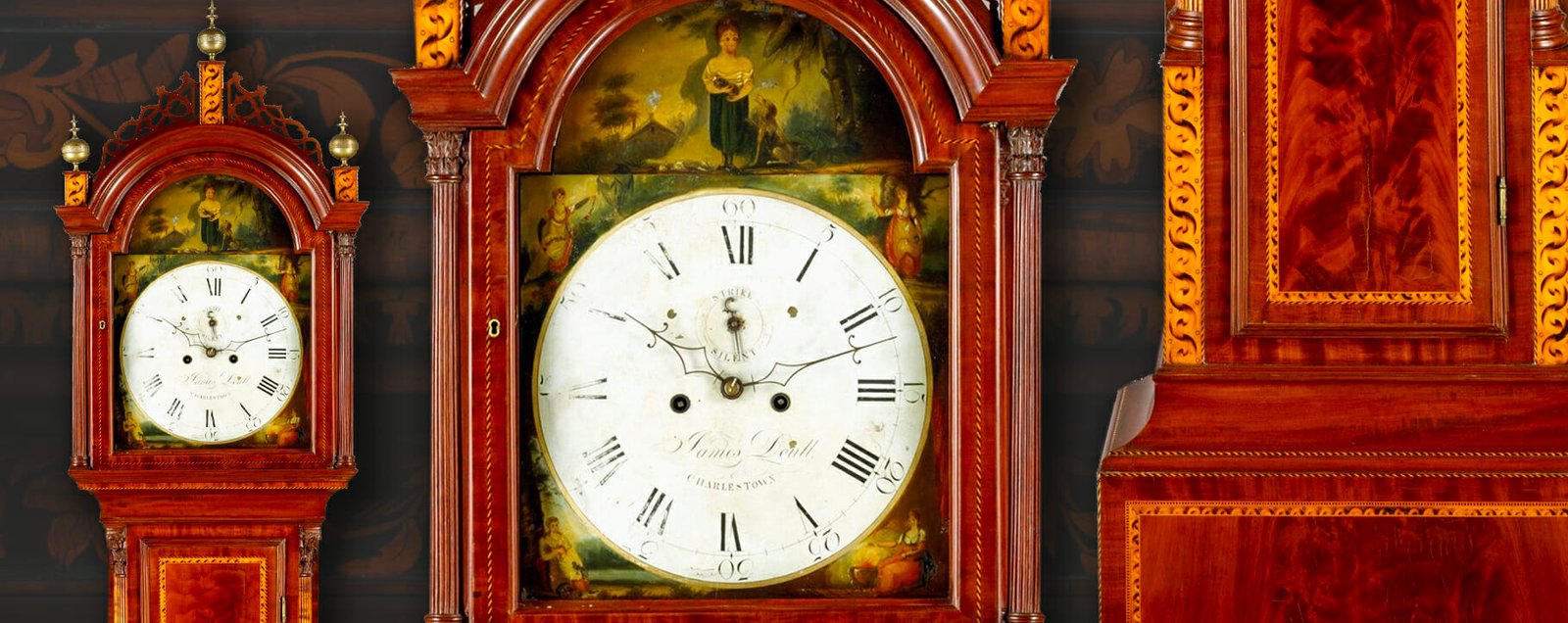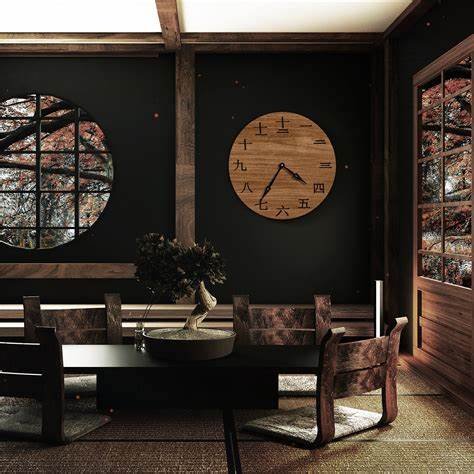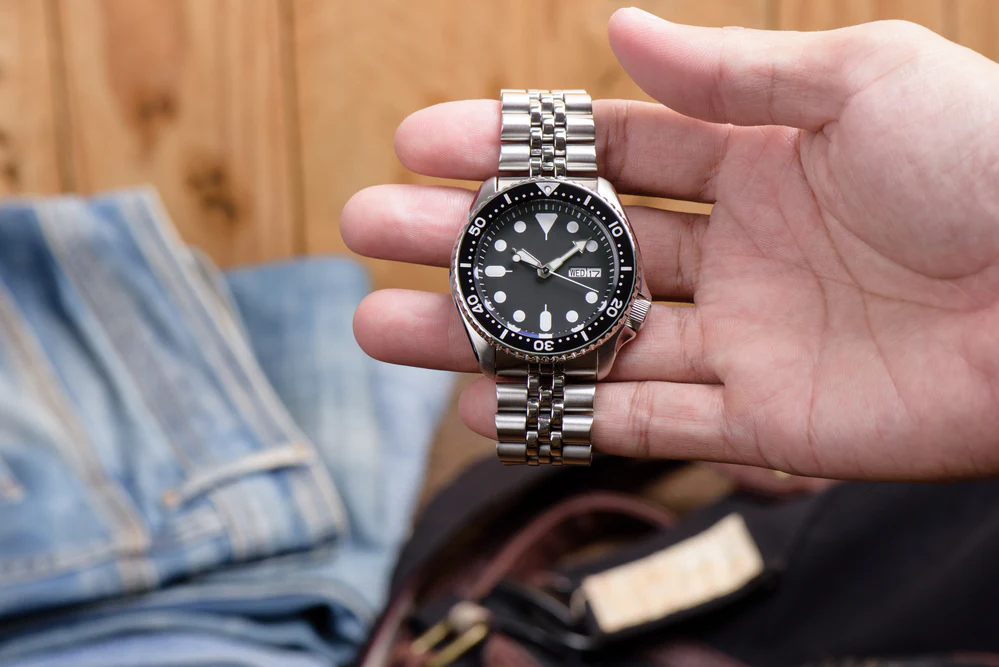In recent years, there has been a resurgence of interest in vintage Japanese clocks. These timepieces, once cherished for their precision, elegance, and craftsmanship, are finding new life in modern homes and offices. Whether through restoration or reproduction, the revival of these clocks reflects a growing appreciation for Japan’s unique approach to timekeeping and design.
This blog post explores the reasons behind the revival of vintage Japanese clocks, their significance in modern interior design, and why collectors and enthusiasts alike are drawn to these timeless pieces.
1. Nostalgia Meets Modern Design
As vintage aesthetics gain popularity in interior design, vintage Japanese clocks are becoming highly sought after. These clocks, with their intricate craftsmanship and cultural symbolism, offer a nostalgic touch that contrasts beautifully with modern, minimalist interiors.
- Timeless Appeal: The simple yet elegant design of vintage Japanese clocks makes them versatile pieces that can seamlessly fit into both traditional and modern spaces. Their timelessness is one of the reasons they have remained relevant across generations.
- Cultural Connection: Owning a vintage Japanese clock is not just about having a decorative item; it’s about connecting to a rich cultural history. These clocks often reflect Japan’s focus on balance, harmony, and simplicity, key principles in Japanese aesthetics.
2. Craftsmanship and Precision: A Lost Art Revived
The meticulous craftsmanship that goes into creating vintage Japanese clocks is something that many modern timepieces lack. These clocks are often handmade, with intricate mechanisms and high-quality materials that ensure their durability and accuracy.
- Attention to Detail: Every piece in a vintage Japanese clock, from the gears to the casing, was carefully crafted by skilled artisans. This attention to detail not only ensures longevity but also makes each clock a work of art.
- Restoration Boom: The revival of these timepieces has sparked a booming restoration industry. Skilled horologists are restoring and preserving vintage clocks, ensuring that the original craftsmanship is not lost. Many enthusiasts are investing in antique clocks, both for their historical value and their unmatched quality.
3. The Intersection of Functionality and Art

One of the reasons for the enduring appeal of vintage Japanese clocks is their dual role as both functional items and artistic pieces. They often feature delicate designs inspired by nature, traditional Japanese symbols, or simple, understated aesthetics.
- Functional Art: Vintage clocks were designed to be practical, reliable timepieces, but they also served as decorative elements in homes and public spaces. Their designs range from minimalist to elaborate, offering something for every taste.
- Unique Designs: From the classic mantel clocks with hand-painted scenes to wall clocks with intricate wooden carvings, vintage Japanese clocks are as much about artistry as they are about functionality. This makes them unique pieces for collectors and those looking to add character to their space.
4. Sustainability and the Appeal of Longevity
In an age where sustainability is increasingly important, vintage Japanese clocks represent a commitment to longevity and quality. Unlike mass-produced modern clocks, these timepieces were built to last, with materials and mechanisms that stand the test of time.
- Eco-Friendly Choice: Choosing a restored vintage clock is an environmentally friendly option. By repurposing an existing item, you’re contributing to the reduction of waste and the preservation of traditional craftsmanship.
- Investment in Quality: Many vintage clocks are passed down through generations, a testament to their durability. Investing in a vintage Japanese clock is not just about acquiring a timepiece, but a piece of history that will continue to function for decades to come.
5. Collecting Vintage Japanese Clocks: What You Need to Know
As interest in vintage clocks grows, more collectors are turning their attention to Japanese timepieces. Whether you’re new to collecting or a seasoned enthusiast, there are a few things to consider when seeking out vintage Japanese clocks.
- Rarity and Authenticity: Some vintage Japanese clocks, particularly those made by renowned clockmakers, are rare and highly sought after. Ensuring authenticity is key, and working with reputable sellers or restoration experts can help verify the clock’s origin and craftsmanship.
- Restoration vs. Original Condition: Some collectors prefer clocks in their original, untouched state, while others seek out restored pieces. Both have their merits — original clocks showcase the wear and history of the piece, while restored clocks often feature working mechanisms and polished aesthetics.
Conclusion
The revival of vintage Japanese clocks reflects a broader trend of returning to craftsmanship, quality, and cultural heritage. These timepieces, with their intricate designs and precise mechanisms, offer more than just a way to tell time — they tell a story. As modern design continues to embrace the blend of old and new, vintage Japanese clocks are finding their place in today’s interiors, proving that great design is truly timeless.
Whether you’re a collector, a design enthusiast, or someone looking to bring a piece of history into your home, vintage Japanese clocks offer a unique blend of artistry, function, and cultural significance.




Dazu gibt es übrigens 75 Freispiele für die Slot Maschine Big
Bass Splash. Wer zumindest 7 Euro einzahlt, bekommt 100%
Willkommensbonus. Kennen Sie das Sprichwort, wonach kleine Geschenke die
Freundschaft erhalten? Denn ohne Aktionen geht heute bei den besten Casinos online gar nichts
mehr. Sparen Sie sich Ihr Geld fürs Spielen,
für die vielen tollen Automatenspiele. Es ist der beste Ort
für all jene, die Casinospiele lieben.
Im Bet GG Casino finden sie alles, was das Spielerherz höherschlagen lässt.
Der Unterschied ist, dass Sie in der Vollversion mit echtem Geld wetten können.
Auf diese Art und Weise muss man nicht erst stundenlang seine Lieblingsspiele suchen, sondern weiß direkt, wo man hinsehen muss!
Es ist sehr einfach auf der Website zu navigieren und
Sie finden alle unterschiedlichen Angebote und Spiele sauber
nebeneinander in Registerkarten angeordnet.
References:
https://online-spielhallen.de/der-frumzi-casino-aktionscode-ihr-schlussel-zu-exklusiven-vorteilen/
Es gibt auch zwei Whirlpools , und die Atmosphäre im Poolbereich ist viel ruhiger als in Vegas vielen Partyhotels.
Die Süßwasserpoolanlage (zum Teil beheizt) bietet erfrischenden Badespaß im
Außenbereich. Entspannen Sie auch im Salon und genießen Sie die Wellnessangebote in diesem Hotel, zu denen Bräunungs-,
Nagelstudios, Massagen und Gesichtsanwendungen gehören. Im Eiffel Tower Restaurant können Sie elegante
französische Küche genießen, während das Le Village Buffet eine ungezwungene Atmosphäre und eine Vielzahl von französischen Gerichten bietet.
Auf über 8.800 Quadratmetern bietet dieses lebhafte Casino eine spannende Auswahl an Spielmöglichkeiten, von den neuesten Spielautomaten bis hin zu
klassischen Tischspielen.
Das Gordon Ramsay Steak im Paris Las Vegas bietet ein stilvolles und
modernes Umfeld, in dem vorrangig von Gordon Ramsay inspirierte
Steak- und Fleischgerichte serviert werden. Das Hotel verfügt über mehr rund 20 Restaurants, Bars und Cafés.
Zu den Annehmlichkeiten gehören große Fenster sowie
komfortable Sitzmöbel.
Vom eleganten Eiffel Tower Restaurant über das klassische französische Bistro Mon Ami Gabi bis hin zum modernen Steakhouse Gordon Ramsay Steak bietet jedes
Lokal eine einzigartige kulinarische Reise. Paris Las
Vegas bietet eine vielfältige Auswahl an Speisemöglichkeiten, die jeden Gaumen erfreuen. Hier können Sie authentische französische Gerichte wie die Bûche de Noël genießen, besonders während der festlichen Saison mit speziellen Menüs zu
Weihnachten und Silvester. Es ist eine perfekte Mischung aus französischer
Kultur und Geschichte, die es den Besuchern ermöglicht, den Charme der Stadt der Lichter zu
genießen, ohne die USA zu verlassen. Eröffnet im Jahr
1999, bietet dieses Resort ein einzigartiges Erlebnis
mit seinen detaillierten Nachbildungen ikonischer Pariser Wahrzeichen wie
dem Eiffelturm.
References:
https://online-spielhallen.de/lucky-dreams-casino-deutschland-ein-umfassender-guide/
Try your luck at the freshly rebuilt casino, which has a total area of
65,000 square feet. With award-winning restaurants and five bars, there’s
plenty to do.
Alternatively, you might relax in your 5-star hotel room and take in the beautiful scenery from your suite.
Before you attend the latest stage play, meet
up with friends and have a meal before the night begins, or taste from
the incredible buffet. There are over six restaurants,
and their website offers a handy online table reservation option. After
hours, choose from outdoor bars, sports bars, or the neighborhood’s hotspot,
The Atrium Bar. You may enjoy lush manicured grounds, an enviable location, and five-star
comfort whether you stay at The Star Grand or The Darling. There are also spa services, an outdoor
pool area, and private cabanas.
View current jackpot sums for games like Golden Dollars Grand, Dinomite, Highway Zone,
Players Paradise Gold, and more. The hosts will gladly answer
any questions you may have about membership requirements and advantages.
There is no limit, and there is a buy-in ranging from $100
to $300 for Texas Hold ’em. On both the Main Gaming Floor and
the Private Gaming Room, there are over 1,400
pokies and video poker machines, making it a pokies lover’s delight.
Below we take you through what you can expect from the
casino in detail. Many attractions are within walking distance of the casino,
located on the picturesque Gold Coast.
References:
https://blackcoin.co/gambling-laws-and-regulations-australia-2025/
Video poker is a super exciting game that has gained immense popularity in the
recent decades, especially with the rise of iGaming.
Of course, we couldn’t possibly ignore Casinonic casino.
However, they can’t be used to test strategies risk-free or just play for fun. They prefer spending their
free time in a bright but at the same time high-quality gambling
club. Our goal is to create a strong community of true gambling
fans. This is why gamblers need websites that provide reliable
and trustworthy information.
The relationship with a great casino doesn’t end after your first deposit.
A typical welcome package might combine a match on your
first deposit with a bundle of free spins on popular pokies.
Understanding the different types of offers is the key
to turning a marketing promise into real value.
They represent the evolving standard for what Aussie players should
expect.
References:
https://blackcoin.co/best-live-casinos-in-australia-2025-guide/
Star City Sydney also offers the Total Star Rewards programme,
offering guests the chance to strike it big in any number of promotions and tournaments.
There are also a host of private bus services from Sydney’s
various suburbs, as well as two government bus
services (the 443 and 888 services) from Circular Quay.
Star City Sydney is easily accessible by either the Metro Light Rail from Central Railway Station or the Monorail from Darling Harbour via the city.
Star City Sydney is the only casino in the Australian province of New South Wales.
Drop by soon and try your hand at blackjack, roulette, poker and other classics.
These the Star Casino news and promotions are
subject to change, and eligibility may depend on the patron’s gaming activity and membership level within The Star Club.
You’ll be spoilt for choice at The Star,
which is home to a dozen of Sydney’s best bars.
We guarantee this is the biggest game you’ve ever played!
One of the venue’s most exciting features is the Stadium – a gigantic 15 x 3.5m mega screen that displays blackjack and roulette dealers while they deal
your cards and roll the dice.
Yes, The Star Casino supports responsible gaming by allowing patrons
to set personal gaming limits and access self-exclusion programs.
Yes, entry to the gaming areas is restricted to individuals who are 18 years and older, with
valid ID required for entry. Yes, you can sign up for The Star Club online via The Star
Casino’s website or mobile app to start earning points immediately.
Additionally, regular audits by independent firms ensure the fairness and integrity of the gaming operations.
References:
https://blackcoin.co/allslots-casino-poker-no-deposit-bonus/
Whatever you’ve got in mind, we can cater for a wide range of occasions, including birthdays
and celebrations, weddings, business conference and meetings,
major community events, festivals, outdoor concerts, and gala dinners.
POKER TOURNAMENTEvery second Saturday from 4pmMore details
here Mindil Beach Casino Resort boasts an exclusive Table Games offering.
Nowhere else can you share the experience of Darwin’s best Italian food, Italian wine,
good times, and great views! The Superior Lagoon rooms offer a private sanctuary
amid a tropical paradise. These rooms offer a private balcony with an outdoor setting with sweeping picturesque views of the lagoon. Nestled amongst the resort, located on the
first floor, the Lagoon Rooms offer a deluxe king bed or 2 queen beds, separate luxury
bathroom, state of the art flat screen TV and mini bar. Relax
on the expansive balcony with day bed, sun lounges, outdoor shower and direct access to
the glistening lagoon pool. The Mindil Suite features generous living area with six-seater dining table, butler’s pantry with kitchenette, powder room, dressing room and oversized double bathroom with a free-standing
bath, television and separate shower.
References:
https://blackcoin.co/sol-casino-in-depth-review/
casino con paypal
References:
http://www.milegajob.com
australian online casinos that accept paypal
References:
http://www.s-golflex.kr
us poker sites that accept paypal
References:
https://icskorea.co.kr/bbs/board.php?bo_table=free&wr_id=577213
online casino mit paypal einzahlung
References:
https://getjobs.company/employer/paypal-gambling-sites-2025-best-operators-with-paypal-payments/
online casino that accepts paypal
References:
https://ispd.org/?post_type=dwqa-question&p=43154
online casino uk paypal
References:
https://www.madhurta.in/employer/best-online-casinos-australia-in-2025-real-money-pokies/